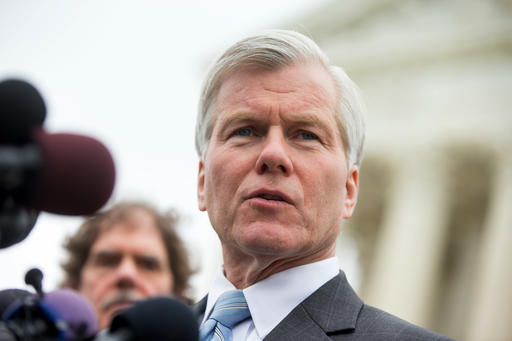RICHMOND, Va. (AP) — Former Virginia Gov. Bob McDonnell is officially a free man, but he paid a heavy price to get there.
Prosecutors announced Thursday they will not pursue a second trial against McDonnell or his wife on corruption charges, a decision that comes more than two months after the U.S. Supreme Court overturned his conviction.
The move by the Department of Justice finalizes a years-long legal saga that ruined the Republican’s once promising political career and put his family’s most embarrassing moments in full public view. It also caps what McDonnell said in a statement has been a transformational event for him personally.
“I have become grateful for this experience of suffering, having used it to examine deeply all aspects of my life, and my role in the circumstances that led to this painful time for my beloved family and commonwealth,” said McDonnell, a devout Catholic. “I have begun to consider how I might repurpose my life for further service to my fellow man outside of elected office. Polls and politics no longer seem that important. People and policies are.”
McDonnell was once one of the GOP’s brightest rising stars. He was a popular swing-state governor with conservative credentials and middle-of-the-road appeal. It was no surprise when he made the short list of potential running mates for Republican presidential candidate Mitt Romney in 2012.
But a year later, McDonnell’s downfall started when details began to emerge of his relationship with a wealthy vitamin executive named Jonnie Williams. And in 2014, he and his wife, Maureen, were convicted by a jury of violating federal bribery law by accepting luxury gifts and loans from Williams in exchange for promoting his dietary supplement.
Williams, who was seeking state university research on his company’s signature anti-inflammatory product, loaned the couple tens of thousands of dollars to help them pay debts and keep their money-losing Virginia Beach vacation rental properties afloat. Williams bought nearly $20,000 in designer clothing and accessories for Maureen McDonnell and a Rolex watch for Bob McDonnell. He also paid for trips and golf outings for the couple and their children, and gave $15,000 for catering at McDonnell’s daughter’s wedding.
The often sensational jury trial produced an enormous volume of evidence and a portrait of a man whose personal life unfolded in stark contrast to his public persona: McDonnell espoused family values and spending restraint while his marriage crumbled, his children had to schedule appointments to see him, and he relied heavily on credit cards and loans.
McDonnell testified in detail about his broken marriage, saying was unable to persuade his wife to undergo marriage counseling after their relationship deteriorated to the point where they could not communicate.
After being found guilty on corruption charges, the former governor was sentenced to serve two years in prison.
But McDonnell was able to avoid prison when his appeal that he’d been unfairly pursued by overzealous prosecutors found a receptive audience at the U.S Supreme Court. The high court unanimously held in June that McDonnell’s actions were distasteful but didn’t necessarily violate federal bribery laws.
At issue in McDonnell’s case was a federal bribery law that makes it illegal for a public official to agree to take “official action” in exchange for money, gifts and other things of value.
In vacating McDonnell’s conviction, the Supreme Court ruled that setting up a meeting or organizing an event — without doing more — isn’t considered an “official act.”
While McDonnell’s actions may have been “distasteful,” Chief Justice John Roberts wrote that the high court’s concern “is not with tawdry tales of Ferraris, Rolexes and ball gowns,” but with “the broader legal implications of the government’s boundless interpretation of the federal bribery statute.”
In his statement Thursday, McDonnell thanked the high court as well as the Department of Justice for not pursing a second trial.
“Forty-three months ago I was a heartbroken man,” McDonnell said. “I struggled to daily summon the strength to perform my cherished final months of duties as governor, being accused by my country of committing crimes of which I knew I was innocent. I have learned to be patient, to trust and wait upon the Lord, and to live each day being content with his daily bread.”
Copyright 2016 The Associated Press. All rights reserved. This material may not be published, broadcast, rewritten or redistributed.






